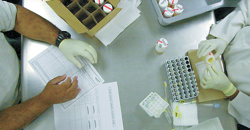By Eve Green

Last week, the Baltimore BioPark played host to the Innovation Working Group, which consists of executives from the U.S.-Russia Bilateral Presidential Commission. The commission was founded as a joint venture between President Barack Obama and Russian President Dmitry Medvedev.
The highly anticipated event is an opportunity for the United States and Russia to find new ways to collaborate on projects in the fields of biotech and science. Members of the group were given a tour of the University of Maryland, College Park and Baltimore BioPark. The event was led by Oleg Fomichev, the Russian Deputy Minister of Economy, and Lorraine Hariton, Special Representative for Business and Commerce of the U.S. Department of State. Among those that joined the three day tour were chief executives of biotech companies from both Maryland and Russia, as well as leaders from the Pushchino BioTech Cluster.
International centers for bioscience
Maryland is one of America’s most important hubs for bioscience and technology; it houses more than 500 life science organizations, as well as 59 federal laboratories. It also boasts some of the most sought-after STEM educational institutions in the country. Despite being situated on the other side of the world, Russia has a lot in common with the American state. It is an equally important location for life science developments; its Pushchino district – on the outskirts of the capital city, Moscow – has more than 100 labs and employs approximately 2,500 biotechnology and bio-pharmacology researchers and scientists.
Academic presentations
Delegates to the event enjoyed several speeches from academics at the University of Maryland. Among those that addressed the group were Dr. Mary Ann Rankin, Provost and Senior VP for Academic Affairs and Dr. E. Albert Reece, Vice President for Medical Affairs, University of Maryland. The professors then took the delegates on a guided tour of one of the state’s most revolutionary centers for bioscience, the Maryland Forensic Medical Center.
Keen to collaborate
In a public statement, Executive Director of the BioMaryland Center, Dr. Judith Britz, said: “We are very pleased to welcome the Innovation Working Group to Maryland, and have the opportunity to showcase our world-class universities and expanding life science community, as well as share approaches to economic development. As a global bioscience leader, Maryland is looking forward to collaborating with the Pushchino BioTech Cluster to identify opportunities for partnering together on joint research and economic development initiatives.”
Opening doors
The event was equally well received by the Russian delegates, with Svetlana Infimovskaya, Deputy Executive Director, Association of Innovative Regions of Russia, saying that she could already see plenty of opportunity for collaboration having visited the state’s bioscience facilities. “Collaboration of Pushchino BioTech Cluster and BioMaryland Center will open an opportunity to join efforts in research and economic development,” she confirmed in a post-event statement.
Following the visit by the group, it is now hoped that the new partnership will lead to many further cutting edge projects and research in the fields of bioscience and health, putting both Maryland and Moscow firmly on the map as international leaders in the scientific research industry.
Impact on other industries
For the past few decades, research scientists in Maryland have completed many groundbreaking projects that could help people all over the world to improve and protect their wellbeing. The revolutionary work of the bioscience sector could have many benefits for other industries too, including industries such as health and insurance. Just this week, for example, researchers at John Hopkins University School of Medicine released the results of a groundbreaking study into tumor cells. The scientists discovered a gene that can put a halt to cell growth when repressed in tumor cells. This cell growth is what leads to enlargement of tumors and spread of cancer. The researchers have labelled this new gene as a “master regulator”, and have stated that it could form the basis for developing a new treatment for harmful cancer tumors. Studies like this could form the basis for new medical treatments that could be implemented through national health insurance schemes. If treatments like these are available on health plans, it could potentially lead to further benefits such as lower health plan premiums, as well as the many obvious health benefits. Aiding development of Maryland’s bioscience industry is a vitally important part of the state’s growth – as well as making a huge contribution to the whole country’s health and medical industry.
